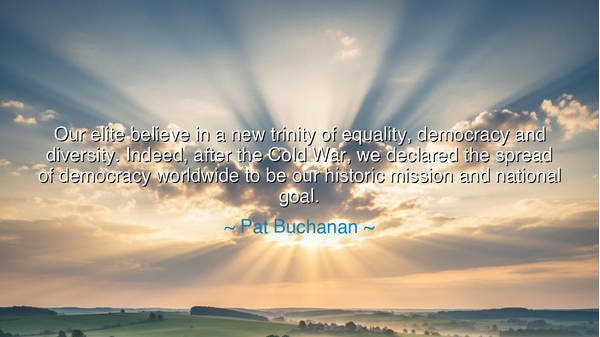
Our elite believe in a new trinity of equality, democracy and
Our elite believe in a new trinity of equality, democracy and diversity. Indeed, after the Cold War, we declared the spread of democracy worldwide to be our historic mission and national goal.






In the unfolding saga of human history, where empires rise and fall, where ideologies clash and evolve, there stands a moment when the guiding principles of a nation come to define not just its future, but the very spirit of its people. Pat Buchanan, in his reflective wisdom, speaks of this moment, this shift in the guiding ideals of power and governance: "Our elite believe in a new trinity of equality, democracy, and diversity. Indeed, after the Cold War, we declared the spread of democracy worldwide to be our historic mission and national goal." These words reverberate with the weight of a nation's ambition, its vision for the world, and the tensions that arise when ideals clash with reality.
To Buchanan, this so-called new trinity is a guiding force for the modern age—an age shaped by the end of the Cold War, the collapse of communism, and the rise of new global dynamics. The ideal of equality speaks to the promise of a society where all are treated fairly, with respect and opportunity regardless of their background. Democracy, the principle that the voice of the people should guide the decisions of the state, stands as a beacon of freedom and participation. And diversity, the idea that a multitude of cultures, ideas, and identities can coexist harmoniously, embodies a future where human differences are embraced rather than feared. These three ideals, as Buchanan suggests, form the new vision for a global order—one where the West leads the charge in spreading these values to the farthest reaches of the earth.
But is this vision truly attainable? In the ancient world, the rise of Athens marked the pinnacle of democratic ideals, where the people held power and their voices shaped the destiny of the city-state. Yet, even in this celebrated democracy, Athens faced struggles with its own ideals—slavery, exclusion of women, and the treatment of non-citizens were stark contradictions to the democratic values the city espoused. The story of Athens serves as a timeless reminder that even the most noble ideals often clash with the realities of human society. Democracy, while a powerful ideal, was far from perfect, and it required constant effort and reform to even begin to live up to its promises. Similarly, in our modern age, the quest for equality, democracy, and diversity is an ongoing struggle, fraught with contradictions and challenges that cannot be easily overcome.
The legacy of the Cold War, and its subsequent end, is often viewed as the triumph of democracy over totalitarianism. After the fall of the Berlin Wall and the dissolution of the Soviet Union, the world witnessed a surge of democratization across the globe, a movement that sought to embed democracy and freedom into the heart of nations once ruled by oppressive regimes. America saw itself as the herald of this new era—its mission now was to spread the values of democracy worldwide, to ensure that nations, from the far reaches of Eastern Europe to the sands of the Middle East, embraced equality and the democratic process. And yet, as Buchanan points out, the path has not been as smooth as many hoped. The spread of these ideals has faced significant resistance, and the results have been mixed at best.
Consider the example of Iraq, a nation whose democratic transformation was championed by the West after the fall of Saddam Hussein. The promise of democracy was held up as the savior, the vehicle for bringing peace, stability, and equality to the region. Yet, the aftermath was marked by chaos, sectarian violence, and political instability. The rush to spread democracy without the proper cultural and historical considerations led to a dissonance between ideal and reality. Similarly, the push for equality in diverse societies often finds itself stymied by cultural resistance, entrenched prejudices, and historical legacies that resist change. Democracy, while powerful, does not always translate smoothly into societies that are not prepared for it, or that view it through a radically different lens.
In this, we find the lesson of Buchanan’s words: the ideals of equality, democracy, and diversity, while noble, must be tempered with an understanding of the complexities and nuances of human society. True progress does not come from the mere spread of these ideals across the world, but from a deep, thoughtful engagement with the people and cultures to which they are being introduced. Equality does not mean the erasure of difference, but the respect for it. Democracy cannot be imposed by force but must be cultivated in the hearts of people, rooted in the soil of their traditions, histories, and desires. And diversity cannot simply be celebrated in principle; it must be nurtured through active participation and integration.
So let us take Buchanan’s words as a call to wisdom. While we continue to pursue the values of equality, democracy, and diversity, we must do so with humility, recognizing that the journey is long, and the path is fraught with obstacles. Let us engage with these ideals not as a mission to impose, but as a goal to nurture, knowing that true progress requires both action and patience. May we work toward a world where these ideals are not just spoken of, but lived, where every individual, regardless of their race, gender, or sexual orientation, is granted the same respect, the same opportunity, and the same voice in shaping the future of our world.






AAdministratorAdministrator
Welcome, honored guests. Please leave a comment, we will respond soon